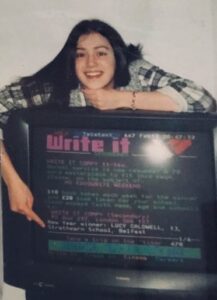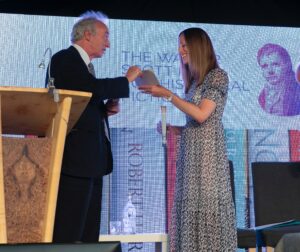Writing tips from the 2023 Walter Scott Prize shortlist
One of the great things about the Young Walter Scott Prize is its connection to published writers, through the Walter Scott Prize. Every year, we ask the authors shortlisted for the WSP to give us their tips for young writers, and they always come up with brilliant advice. You can read the written tips from the seven authors shortlisted for the 2023 WSP below, and watch our specially commissioned videos on our YouTube channel here.
And if you needed any more proof that writing competitions inspire young writers, two of this year’s shortlist – Elizabeth Lowry and the winner Lucy Caldwell – won creative writing competitions when they were young, which spurred them on to pursue careers as authors. Here’s Lucy at 13 years old winning the Teletext ‘Write It’ competition, and winning the 2023 Walter Scott Prize!


Lucy Caldwell (winner with These Days)
I have just finished reading Antonia Barber’s book The Amazing Mr Blunden, one of my own favourite childhood books, aloud with my 8 year-old son. In it, a brother and sister in our present day have to travel back in time to save the lives of another brother and sister who died in a fire a hundred years ago. The way time-travel is explained to them is that both times exist simultaneously, just at different points on a turning wheel. And what I’d say to young writers beginning to write historical fiction is this: for your characters, it isn’t history! For your characters, it hasn’t happened yet. That point in time, that point in their lives, is the cutting-edge – the furthest they’ve come – the furthest it’s possible to go. The past is not past – it’s not even present – it is the future too! If you can remind yourself of this, then everything you write will seem alive, even if, from our point on the wheel, we know, or think we know, what might come next for them…
Adrian Duncan (The Geometer Lobachevsky)
I’d recommend to anyone really to read Marguerite Yourcenar’s Memoirs of Hadrian. It is a truly beautiful work from which I’ve learned much. It helped me to think about the voice of the character in my book as being human first, and from ‘elsewhere’ second.
Robert Harris (Act of Oblivion)
Treat the past with respect. Don’t condescend to it. Remember the great remark of the historian F.W. Maitland: “We should always be aware that what now lies in the past once lay in the future.” In other words, don’t just insert modern characters into your story and dress them up in old costumes, but try to imagine how they thought and felt.
Elizabeth Lowry (The Chosen)
Get to know as much about the physical and human texture of the historical moment or period you plan to write about as you can – what people wore and ate and drank and read, how they spoke, what they gossiped about, what their homes looked like, and what they did for fun. Find the everyday things that will make you (and your reader) feel at home in that world. Before you know it your characters will be talking and behaving like real people.
Fiona McFarlane (The Sun Walks Down)
My tip would be to pay attention to all the little details of your own world, the things that make it particular to you: the songs you hear, the food you eat, the way people speak, the sound of traffic, the way your dog looks when she wants you to play with her. All these things make up the dense texture of your life in 2023. Now, imagine your way back into the characters of your historical short story. What are the details that make their worlds particular to them? What do they hear, see, touch, taste, and smell?
Simon Mawer (Ancestry)
My first tip to any aspiring writer is, read your writing out loud and listen to yourself, as objectively as possible. How does it sound? Does it sing? Or does it sound flat? Perhaps to aspiring writers of historical fiction I would add, avoid anachronisms like the plague…and if you don’t know what an anachronism is, look it up! In one book I had a character cross the road at a zebra crossing. The year was 1948 and it still hurts to think about it because the first zebra crossing was introduced, experimentally, in 1951. Mind you, that book did go on to win the Walter Scott Prize for Historical Fiction…
Devika Ponnambalam (I Am Not Your Eve)
The advice I would give to a young person writing historical fiction is…is there a person in the past that captures your imagination? What is it that you wonder about them? You must want to know everything about them, how they lived, how they died, what they saw when they opened their eyes. It is this passion to tell their story that will take you from the beginning to the end.
You can find out more about the WSP 2023 authors and their books here.
